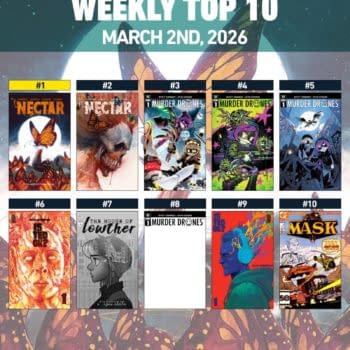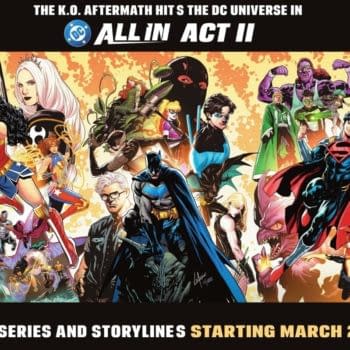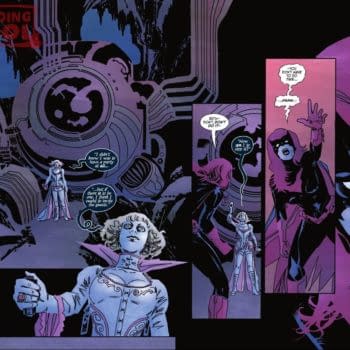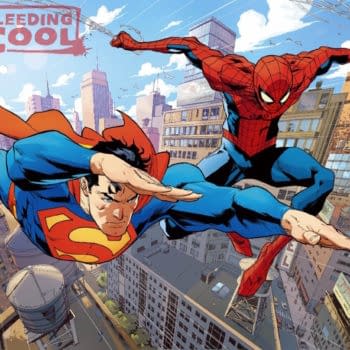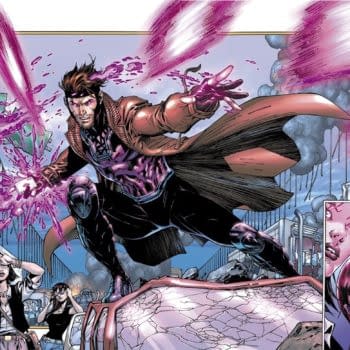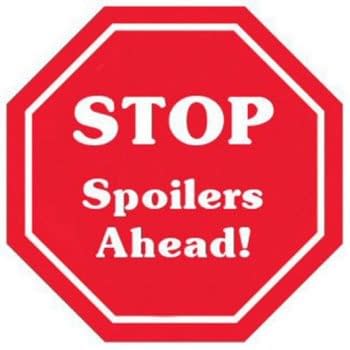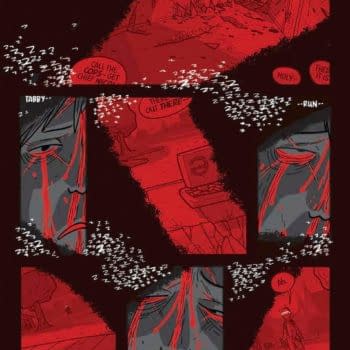Posted in: Comics | Tagged: absolution, avengers academy, christos gage, Comics, marvel, MVL
Ten Questions With Christos Gage

KD: The foundation for the AVENGERS: THE INITIATIVE series came from the CIVIL WAR storyline, and during your tenure on the series, it tied heavily into other "big event" storylines like SECRET INVASION, DARK REIGN, and SIEGE. How did you find balance between telling your story of the INITIATIVE characters and simultaneously fulfilling the overall editorial vision for the crossovers?
GAGE: I wouldn't say there was an overriding editorial vision for the crossovers. Marvel tells you a crossover is coming and what it's about, and if you want to participate it's totally your call. The nature of INITIATIVE, being sort of a superhuman army that responds to crises, made it very easy and natural to tie in to events. That's what they do. So it was really a matter of finding ways to advance individual stories and develop characters in the context of the event, which wasn't too difficult. You tend to have quite a bit of advance notice so you can lay the groundwork. For example, Dan Slott knew Hank Pym was a Skrull as far back as issue #2, well before I ever came on board, and the SECRET INVASION crossovers didn't start until, what, #14? So you plan accordingly.
KD: AVENGERS: THE INITIATIVE featured an interwoven cast of dozens: established second-tier heroes (Tigra, Justice, War Machine, just to name a few), less recognizable characters (Slapstick, Prodigy, Diamondback), and newbies (MVP, Komodo, Gauntlet). In its thematic follow-up AVENGERS ACADEMY, there's a tight focus instead on a small group of brand new characters. What were the reasons behind this change?
GAGE: My feeling was that the basic premise of AVENGERS ACADEMY – that these kids are at great risk of becoming villains – wouldn't have worked with established characters. If we'd put in, say, a couple of the POWER PACK kids, nobody, including me, is going to believe for a second that they could become the next Dr. Doom. Even if we had done something like have Norman Osborn torture them the way he did the new characters, it still doesn't fly. People already know who they are. With brand new characters, anything could happen. They could become villains, they could get killed… it's all up to us as the creative team to make whatever path they take work emotionally. New characters are a risk in the marketplace, but to me it's the only way this could have worked. And we did have the advantage of familiar characters for the teachers. So it was a calculated risk. As for the focus on a smaller group, by the same token, if you're giving people characters they don't already know, you need to put in the time and effort to get your readers invested in them. A tighter group allowed us to do the "spotlights" on each of the kids in issues #1-6.
KD: The artists attached to AVENGERS: THE INITIATIVE and AVENGERS ACADEMY… it's like a Who's Who of my favorite artists: Stefano Caselli, Humberto Ramos, Mike McKone. You've worked with a lot of talented artists – has there been one (or a few) that you really felt especially clicked with your creative vision?
GAGE: I've been very privileged to work with some of the best in the business. It sounds corny, but you really can't pick favorites. It's like, who's better, Alex Toth or John Buscema? Can you really say? Very different styles, both masters of their craft. You look at who we have alternating on ACADEMY now, Tom Raney and Sean Chen. Their work doesn't look the same, but they both tell great stories. Tom's last two pages of #12, the moment between Mettle and Hazmat, and Sean's work on #13, the prom issue, are both examples of amazing character work in different styles of art. Each relationship I've had with an artist has been unique; I don't think you can point to one and say I clicked with them like a Moench/Gulacy or Loeb/Sale team. Maybe Mike Perkins on UNION JACK… that's a case where I was still pretty new to comics and if I'd thrown that crazy mix of chaos, six-panel action pages and D-list villains at the wrong guy, it could have been a mess, but because Mike and I love the same obscure 70s comics and he's such a pro, it turned into something magic. But look, at Marvel, you're generally working with the best in the business. It's magic more often than not.
KD: In the past year, you worked on both INVADERS NOW and AVENGERS ACADEMY, respectively the forebears and inheritors of the Avengers mantle. Seeing as you worked on these generational titles simultaneously, did you see these stories as individual projects, or was there a feeling that you were contributing to a larger legacy?
GAGE: Well, I look at everything I do for Marvel as contributing to a larger legacy that goes back to 1939. Not to sound like I think my stuff's special; all Marvel comics are part of that. But I approached those two projects as separate things. That's how most readers are going to approach them. With INVADERS, however, there's a definite sense of history to it. I had to get the flashback in there of the Human Torch burning Hitler to a crisp. That may be my favorite moment of the series, the two mutant kids nervously going up to the Torch and asking him about it. Imagine if the guy who killed Hitler was still around and you could talk to him? How cool would that be? With AVENGERS ACADEMY, it's more about the future… and that future could be bright, or it could be dark indeed.
KD: You've worked frequently with collaborators on scripts: Dan Slott on AVENGERS: THE INITIATIVE, Mike Costa on G.I.JOE: COBRA, and Alex Ross on INVADERS NOW. Considering your contribution to these partnerships, have you found that there are certain strengths that you tend to bring to the table (overall concepts, dialogue, pacing, etc.) while the other writers focus on other aspects of the craft?
GAGE: It's different every time. I know with me and Mike, he knew who the G.I. JOE characters were and I had no idea. So that was helpful because he's approaching it with knowledge of their histories, while I'm just out to tell a good espionage thriller. I mean, that's what he wants too, but I brought the P.O.V. of an outsider, the guy who's a total newcomer, which is something I can't do on my Marvel books. So I think as a team, we were stronger than we would have been individually… which is the goal with a team, or why do it? Otherwise, it's just twice the work for half the money, you know?
With Dan, we have similar sensibilities in terms of a love of continuity and sense of humor, but we work very differently. He usually works plot-first, breaking down the page without dialogue (though he conveys the basics of what the characters are saying/feeling), and he writes the dialogue after the art comes in. I write full script – dialogue and all, right from the start – but working with Dan taught me to be open to changing things if inspiration strikes after seeing the art. Maybe one character looks angry instead of sad, so you adjust the dialogue accordingly, and get an idea for something better than what you started with. It makes for better comics. As far as what I brought, I'm a pretty disciplined writer in that I get up early every day and write five pages, come hell or high water, if it takes one hour or twelve. I punch the clock and put in my shift. I don't get writer's block. Writer's block is for rich people; I have bills to pay. Dan, on the other hand, is a perfectionist who will agonize over a line of dialogue for days. He'd rather starve than get a less-than-perfect line down. What I did was get the stuff done on time, and force him to make a quick decision – you got something better? Get it down now, or let it go. So we each pushed the other to exercise writer muscles we weren't used to working and maybe rethink how we approach things. I like to think we made each other better writers… and still do, since we still collaborate from time to time, like on some upcoming SPIDER-MAN stuff.
As for Alex, he was very gracious about stepping back and letting me focus on the scripting. We mostly worked together on the plotting, motivations, themes, and larger arcs. He'd been setting a lot of these things up going back to AVENGERS/INVADERS. And, of course, anything visual, I stepped back and let him go nuts, like designing the new Iron Cross. That, to me, was the most clear-cut case of dividing the duties based on our individual strengths.
KD: Just as you're frequently partnered with other writers on projects, you're also very visible pals with a lot of other writers in the industry, joining them at store signings and convention panels. What can you tell us about the behind-the-scenes camaraderie of comic creators?
GAGE: Well, we tend to like each other. We share a love of comics and we're all very excited to be doing this for a living. You know how maybe when you were a kid, if you met another kid who happened to be into comics, how excited you both were to have someone you could talk to on that level? That's how we are. And comics folk tend to be nice people. You don't get into it to get rich or famous. Even Jim Lee, he walks out of the convention hall and down the street to 7-11, the clerk has no idea who he is, he can't jump the line. You have to stay real in this business, but you don't have to completely grow up. That makes for good folks, I think.
KD: In G.I.Joe: Cobra, the fan-favorite mainstays of the Joe team are practically out of sight. Instead, you focused your attention on characters who some might consider historically as comic relief (Tomax and Xamot), background characters (your hero, Chuckles), and virtual unknowns (Chameleon). Where did the impetus come from to tell this story using these characters?
GAGE: That was all Mike. I had no idea who they were. Now, by the second miniseries, we had kind of hit a groove as far as taking obscure or silly characters and trying to bring out what made them cool. I was hell bent and determined to bring Croc Master into the IDW Joe universe, because the idea of this guy in a wetsuit with trained crocodiles jazzed me as being awesome comics, the way concepts like Kamandi do. Mike was dying to make Crystal Ball really scary. And I wanted to try to think of a way to make Serpentor and Golobulus work in a more real world setting. The current incarnation of Serpentor is probably my most visible contribution to the IDW Joe-verse.
KD: When I read your detective graphic novel, AREA 10, I was immediately taken aback by its pacing. I didn't feel like I was reading a comic book at all; it felt more like a tightly-scripted, gripping television drama – which, of course, you have experience writing. What would you say are some storytelling skills you've picked up from one medium and brought to the other?
GAGE: Thanks! Yeah, my wife Ruth and I have written for Law & Order: SVU, and we actually wrote AREA 10 as a movie screenplay initially, but our manager at the time felt it was too dark to sell, so I pitched it to Vertigo and adapted it to graphic novel form. I think comics and screenwriting are probably the two closest forms of writing to each other. You have to write and think for a visual medium. That said, TV can be very dialogue oriented, and a lot of TV writers, when they write comics, don't take full advantage of the fact that it doesn't cost any more to have your characters exchanging sweet nothings in the park than in the Negative Zone. I think letting the visuals tell the story as much as possible is an important thing to learn in both worlds. But they are pretty closely related, and often, I think, feed off each other. Even now, as I watch a dozen years' worth of Buffy and Angel shows for my upcoming ANGEL & FAITH book, Joss' sensibility is probably affecting my approach to AVENGERS ACADEMY as much as the Whedonverse book. And I can see the influence stuff like the Claremont/Byrne X-MEN had on his shows. It's fun to see it all click.
KD: You had been one of the main architects on the WildStorm line in its twilight years of publication, having worked on such titles as ARMAGEDDON, REVELATIONS, and WILDCATS. What are your thoughts and reflections on the end of an era?
GAGE: I love WildStorm. I love the books and the characters and the people. Darick Robertson and I are doing a creator-owned miniseries for them (which I think will now come out from DC proper) and I've finished my part, but I am stalling on getting Ben Abernathy the rewrite on the final issue as long as possible… because as long as it's unfinished, I'm not yet done working for WildStorm. Just great folks.
Personal experience aside, WildStorm had a huge impact on what the modern comic industry looks like… which I think contributed to its eventual end. Guys like Warren Ellis redefined what a superhero comic could be, doing things nobody would have dreamed of doing at Marvel and DC. Then Marvel and DC hired those people to come do the same thing with their characters, and the Wildstorm Universe wasn't so unique anymore. Not to suggest that the characters don't have inherent merit – they do, and I think they can and will be back in awesome comics, but I think we almost needed a break to let them breathe a little and revisit them down the road.
The other thing that was a strength of WildStorm but also led to its end was that, the WSU characters aside, it didn't have a distinct brand identity the way that Vertigo does. Books like PREACHER and SANDMAN can end, but there's still a Vertigo "brand" – literary, adult comics with a horror or fantasy bent. WildStorm didn't have that. Their creator-owned books were as eclectic and varied as MYSTERIUS and THE HIGHWAYMEN, and that was very purposeful. They wanted to be a home for just plain good comics. But at the end of the day, again, it didn't make sense to keep the line going from a business perspective when those books could just as easily come out from DC or Vertigo, in many cases.
But WildStorm will be back in some form. Jim Lee will make it happen. I'm really honored to have worked there, and my book with Doug Mahnke, STORMWATCH PHD, remains one of my favorite things I've done.
KD: ABSOLUTION is one of the most intensely personal comic book stories I've read. People can really emote with John Dusk – how he's sickened by the horrible crimes he's seen, how he's haunted not by his deadly pursuit of justice but rather the deception he has to maintain. The story is so personal that after reading, I wondered how much was purely fiction and how much was drawn from its writer. What are your thoughts on where that character begins, and where your own views end?
GAGE: Oh, I'm not remotely as badass as John Dusk. In fact, here's how much of a wuss I am: here's the secret origin of Happy Kitty, the sword-wielding insane assassin chick in the Sailor Moon outfit from ABSOLUTION. My cats like to sit on my lap or beside me when I write, and I rub their bellies and say, "Who's a happy kitty?" And one day, I thought that sounded like a fun name for a character and made up Happy Kitty. There you go… no stories of chugging absinthe and mescaline and having Cthulhu plant a story in my head with his barbed tentacle penis for me. I'm a boring, happily married comic book nerd. My wife is really more like John Dusk than I am… in fact, she's the one who came up with the idea of a superhero serial killer. She has an amazing sense of justice; she watches a Dateline about a thirty-year-old murder and she wants to go back in time and kill the son of a bitch.
But I really think John Dusk is somewhere in all of us. When we see injustice, something horrible done, and our instinct is a very Old Testament desire for swift and decisive retribution, civilization be damned, that's John Dusk. The reaction of otherwise tree-hugging, Whole Foods-shopping, vegetarian liberals like myself when Osama Bin Laden was killed – Fuck Yeah! – that's John Dusk. I will say that working on Law & Order: SVU influenced ABSOLUTION a lot. Those stories are based on real cases. Once you've reviewed enough material on sex crimes, and you know the recidivism rate of the offenders, and the horrible things they do, you really just feel that they should be taken out back and shot, for the good of the world. The problem with someone like John Dusk is that you are putting ultimate power in the hands of one flawed human being. Most of the time, I want the legal system we have now. But sometimes I want John Dusk. So now I have the comics, to scratch that itch.






